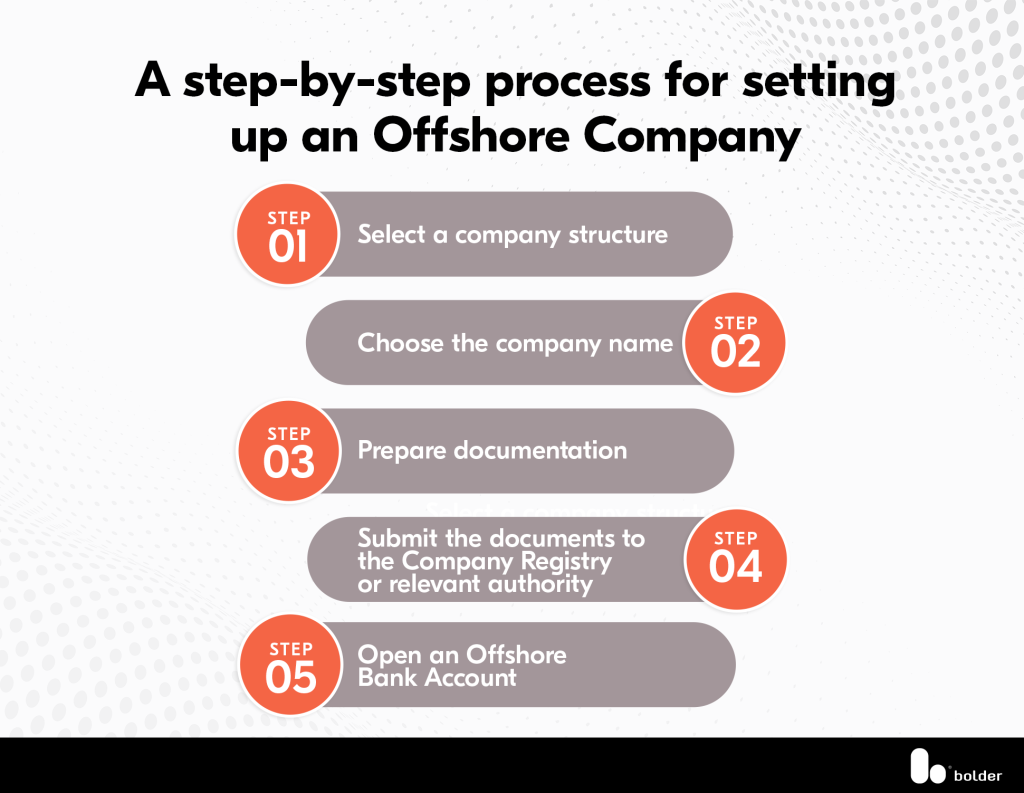How to Pick the Right Country for Offshore Company Formations
Recognizing Offshore Business Formations: A Comprehensive Overview to the Refine and Benefits
Offshore business formations offer a calculated avenue for business owners seeking to enhance their business procedures. These entities often provide advantages such as tax obligation benefits, boosted personal privacy, and durable property protection. Comprehending the intricacies of picking a territory, the development procedure, and compliance demands is important. As the landscape of international company evolves, the ramifications of developing an offshore company warrant mindful factor to consider. What actions should one require to navigate this facility terrain?
What Is an Offshore Company?
An overseas business is a service entity integrated outside the territory of its proprietors' house, typically in a nation with positive regulative and tax environments. These companies can serve various functions, consisting of possession protection, international trading, and riches administration. They are normally developed in territories referred to as tax obligation havens, where business tax obligation rates are reduced or nonexistent, and personal privacy regulations are stringent.
Offshore companies may be possessed by individuals or various other business entities and can operate in different sectors, consisting of consulting, money, and shopping. While they offer particular advantages, the legal and governing structures governing overseas business differ substantially by jurisdiction. Entrepreneur should navigate these intricacies to guarantee conformity with both regional and global regulations. Comprehending the structure and function of overseas firms is necessary for individuals considering this option for service operations or possession management.
Advantages of Creating an Offshore Company
While the choice to form an offshore firm may come from numerous strategic considerations, the potential benefits are compelling for several entrepreneur. One significant advantage is tax obligation optimization; several overseas territories use beneficial tax prices and even tax exceptions, allowing companies to maintain more earnings. Furthermore, offshore business frequently offer boosted personal privacy protection, protecting the identifications of investors and supervisors from public analysis.


Finally, local business owner might find functional adaptability, as offshore jurisdictions frequently have less governing difficulties, allowing streamlined monitoring and administration. Jointly, these benefits make overseas business formations an eye-catching option for lots of looking for to expand their company horizons.
Selecting the Right Jurisdiction
Selecting the suitable jurisdiction for an offshore company is a crucial action in taking full advantage of the advantages outlined previously. Various variables influence this decision, including tax policies, business laws, and the general organization setting. Jurisdictions such as the British Virgin Islands, Cayman Islands, and Singapore are usually preferred for their desirable tax regimens and robust legal frameworks.
It is vital to take right into account the specific demands of business, such as personal privacy demands and regulatory conformity. Additionally, the ease of operating, consisting of the performance of company enrollment and banking facilities, plays a considerable duty.
Prospective owners ought to also assess the political security and online reputation of the chosen territory, as these components can impact lasting success. Inevitably, comprehensive study and expert appointment are suggested to guarantee placement with the firm's objectives and to utilize the full possibility of offshore advantages.

The Offshore Firm Formation Process
The offshore firm formation procedure involves a series of necessary actions that need cautious preparation and execution. Companies or people have to choose an ideal jurisdiction that aligns with their objectives, considering aspects such as tax advantages, personal privacy, and regulatory environment. Following this, the next action entails selecting the proper business structure, such as an International Organization Business (IBC) or Minimal Responsibility Firm (LLC)
When the framework is determined, necessary files, including a company plan, identification, and proof of address, should be prepared. Involving a reliable local agent or service supplier can simplify this stage, making sure compliance with local laws. After submitting the required documents to the pertinent authorities, the formation process normally culminates in the issuance of a certification of unification. This paper establishes the firm as a legal entity, allowing it to conduct business globally.
Legal Needs and Compliance
Recognizing the legal demands and compliance commitments is essential for any person looking to develop an overseas firm. Each jurisdiction has particular regulations that should be stuck to, which can consist of business enrollment, obtaining needed licenses, and maintaining local addresses. Offshore Company Formations. It is essential to select a registered representative that can assist in communication with local authorities and assurance conformity with recurring reporting needs
Furthermore, many jurisdictions require the submission of annual financial declarations, together with tax filings, even if the firm does not produce revenue. Shareholders and supervisors should be recognized, with due diligence treatments often mandated to confirm their identities. Failure to fulfill these legal commitments can cause fines or the dissolution of the firm. Therefore, prospective offshore business owners must speak with lawyers experienced in international company legislation to browse these intricacies effectively and guarantee full conformity with all policies.
Tax Effects of Offshore Companies
The tax implications of offshore companies existing considerable benefits that bring in numerous business owners. Recognizing the linked compliance needs is vital for maneuvering the intricacies of international tax regulations. This area will discover both the potential advantages and the required obligations connected to offshore service frameworks.
Tax Advantages Review
Although overseas business are frequently watched with uncertainty, they can supply considerable tax obligation advantages for people and companies looking for to enhance their financial approaches. Among the key advantages is the possibility for reduced corporate tax rates, which can lead to substantial cost savings. Lots of overseas jurisdictions offer beneficial tax obligation regimes, including zero or minimal tax obligation on earnings, funding gains, and inheritance. In addition, overseas companies can promote international organization operations by minimizing tax obligation responsibilities connected with cross-border transactions. This framework may additionally enable tax deferral possibilities, enabling revenues to expand without instant taxes. Inevitably, these advantages add to improved financial performance and possession protection, making overseas companies an eye-catching alternative for wise capitalists and business owners.
Compliance Requirements Discussed
Offshore business might provide tax obligation advantages, yet they also feature a collection of conformity requirements that have to be meticulously browsed. These entities are subject to specific reporting commitments, which vary considerably depending upon the territory. Commonly, offshore companies must maintain accurate financial records and submit yearly financial statements to follow local policies. Additionally, several territories need the disclosure of helpful ownership to battle money laundering and tax evasion. Failure to comply with these compliance procedures can cause serious penalties, including penalties and possible loss of company licenses. Comprehending the regional tax obligation regulations and global agreements is important, as they can impact tax obligations and general operational legality. Involving with economic and lawful experts is a good idea to guarantee complete compliance.
Preserving and Managing Your Offshore Company
Maintaining and managing an overseas firm involves sticking to different ongoing conformity requirements vital for lawful procedure. This consists of diligent monetary record keeping and try this an understanding of tax obligation responsibilities significant to the company's territory. Effective monitoring not only ensures regulatory compliance but likewise supports the firm's monetary wellness and long life.
Continuous Compliance Requirements
Ensuring recurring conformity is vital for any kind of entity operating in the offshore sector, as failure to meet regulative demands can bring about considerable penalties and even dissolution of the firm. Offshore business need to follow regional laws, which might include annual declaring of financial statements, settlement of necessary fees, and maintaining a licensed workplace address. Furthermore, firms are usually called for to designate a local representative or agent to assist in communication with authorities. Normal updates on changes in legislation or tax obligation needs are important for compliance. In addition, adherence to anti-money laundering (AML) and know-your-customer (KYC) laws is imperative. By preserving arranged documents and remaining notified, overseas companies can assure they continue to be compliant and alleviate threats associated with non-compliance.
Financial Document Keeping
Efficient financial document maintaining is necessary for the successful monitoring of any overseas business. Maintaining thorough and accurate monetary records aids in tracking the firm's performance, guaranteeing compliance with neighborhood guidelines, and helping with educated decision-making. Business must apply methodical processes for documenting income, costs, and purchases to produce openness and liability. Utilizing audit software program can enhance this process, permitting real-time monetary analysis and reporting. On a regular basis assessing monetary statements helps identify trends, evaluate profitability, and manage cash money flow properly. It is essential to safely save these documents to secure delicate details and warranty simple gain access to during audits or financial evaluations. By focusing on thorough monetary record maintaining, offshore business can improve operational effectiveness and assistance long-lasting success.
Tax Obligation Responsibilities Summary
Comprehending tax obligation obligations is essential for the proper monitoring of an offshore company, as it directly affects financial efficiency and conformity. Offshore business may be subject to different tax laws depending upon their territory, including company taxes, value-added tax obligations, and withholding tax obligations. It is essential for business proprietors to remain educated regarding their tax obligation responsibilities, as failure to abide can cause penalties and legal issues. In addition, several overseas territories use tax motivations, which can considerably profit services if browsed properly. Involving a knowledgeable tax advisor or accountant specializing in global tax obligation legislation can aid assure that firms fulfill their commitments while optimizing their tax obligation methods. Ultimately, persistent tax management adds to the overall success and sustainability of an offshore entity.
Regularly Asked Inquiries
Can I Open a Savings Account for My Offshore Firm Remotely?
The capacity to open up a bank account for an offshore firm remotely depends upon the bank's policies and the jurisdiction's policies. Several financial institutions offer remote services, however specific needs might differ substantially between establishments.
What Are the Prices Associated With Forming an Offshore Company?
The expenses associated with forming an overseas company generally consist of registration charges, legal and consulting expenses, and continuous maintenance costs. These costs vary substantially based upon territory, intricacy of business structure, and like it particular services called for.
Exist Limitations on Who Can Be an Investor?
Restrictions on investors differ by jurisdiction. Some nations may enforce constraints based upon organization, residency, or citizenship kind - Offshore Company Formations. It's vital for possible investors to study certain policies appropriate to their picked offshore area
How much time Does the Offshore Business Development Process Normally Take?
The overseas business development process typically takes in between a couple of days to several weeks. Aspects influencing the timeline include territory needs, file prep work, and responsiveness of pertinent authorities included in click here for info the registration procedure.
What Takes place if I Fail to Follow Regional Regulations?
Failing to adhere to neighborhood legislations can cause extreme charges, consisting of penalties, lawsuit, or loss of organization licenses - Offshore Company Formations. It may likewise harm the company's track record and impede future company possibilities in the territory
An offshore business is a company entity included outside the jurisdiction of its proprietors' residence, frequently in a country with desirable regulative and tax settings. One substantial advantage is tax optimization; lots of overseas jurisdictions offer favorable tax prices or also tax exceptions, enabling companies to preserve more earnings. Offshore firms are usually checked out with apprehension, they can supply significant tax obligation benefits for people and organizations seeking to enhance their monetary techniques. In addition, offshore firms can facilitate international company procedures by minimizing tax obligation liabilities linked with cross-border transactions. Offshore firms might be subject to numerous tax obligation laws depending on their jurisdiction, consisting of company tax obligations, value-added tax obligations, and withholding tax obligations.